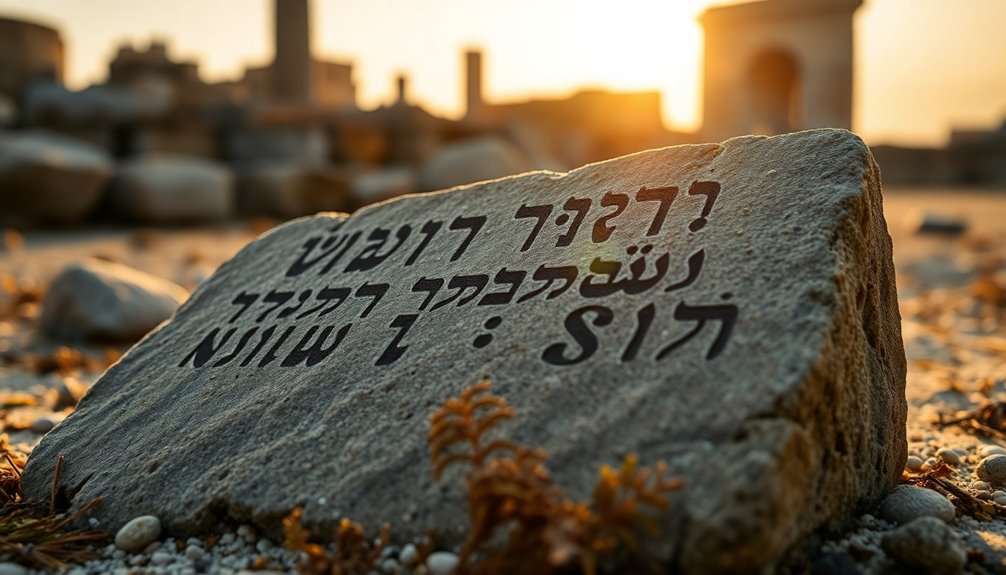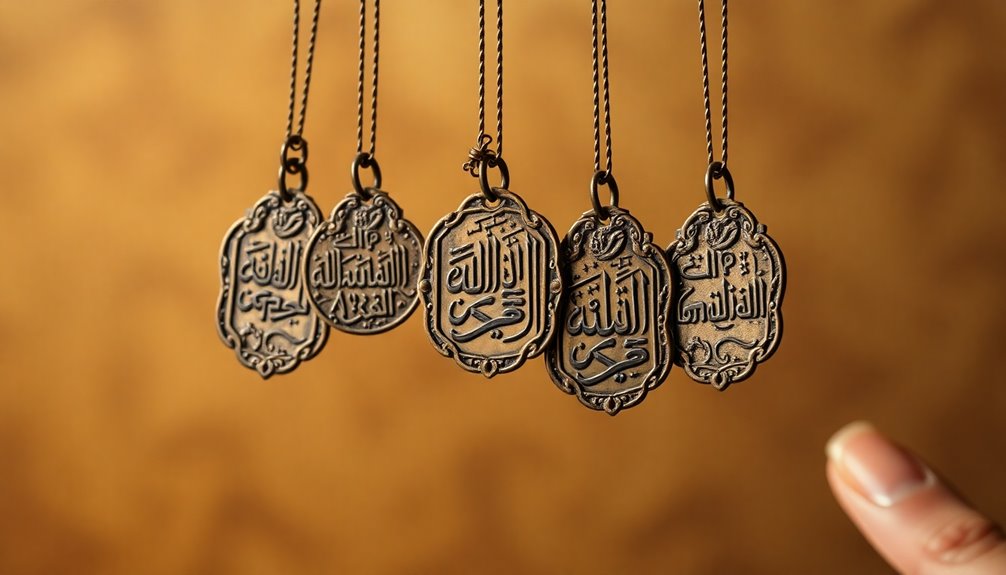The seven names of God reveal His character and deepen your spiritual connection. These names—Elohim, YHWH, El Shaddai, Jehovah Jireh, Jehovah Rapha, Jehovah Nissi, and El Olam—each showcase unique attributes. Elohim highlights God's creativity, while YHWH emphasizes His eternal nature. El Shaddai reflects His power, and Jehovah Jireh reassures you of His provision in times of need. Jehovah Rapha promises healing, Jehovah Nissi denotes His protective presence, and El Olam showcases His unchanging character. Exploring these names can transform your understanding of God and enrich your faith journey beyond the surface.
Key Takeaways
- Elohim signifies God's creative power and the Trinity's involvement, highlighting His sovereignty.
- YHWH represents God's eternal self-existence and personal relationship with humanity.
- El Shaddai showcases God's omnipotence and faithfulness to His covenant promises.
- Jehovah Jireh affirms God's provision in times of need, while Jehovah Rapha emphasizes His healing and restoration promises.
- Additional names like Jehovah Nissi and El Olam reflect God's protective presence and unchanging nature, respectively.
Introduction

Understanding the significance of the names of God can deepen your faith and enhance your spiritual journey. The nomenclatura de Deus reveals various aspectos de Seu caráter, allowing you to appreciate the multifaceted nature of His being. Names like Elohim, which means Creator, showcase His sovereignty and power, while Jeová-Jiré emphasizes His promise to provide for you.
Similarly, Jeová-Rafa, the Lord who heals, assures you of His care and compassion. By exploring these names, you not only learn about His attributes de Deus but also foster a relação pessoal and intimacy com Deus. Each name serves as a reminder of His unwavering promises and encourages a deeper adoração in your life.
Recognizing these divine titles can transform your understanding of who God is and how He interacts with you. As you delve into the meanings behind these names, you'll find that they enrich your prayer life and spiritual practices.
This journey through the names of God is an invitation to trust in His character and to embrace the relationship He desires with you. Embrace this exploration, and let it strengthen your faith and connection with the Almighty.
Biblical Names Explained

When you explore the biblical names of God, you'll discover their deep meanings and significance.
Each name ties back to specific scripture references, revealing unique aspects of His character and relationship with humanity.
Let's take a closer look at both primary and secondary Bible references to gain a fuller understanding.
Primary Bible References
The names of God in the Bible reveal deep insights into His character and attributes, each one resonating with profound meaning. For instance, Elohim, found in Genesis 1:1, emphasizes God's power as the Creator, highlighting His authority over all criação and suggesting the involvement of the Trinity.
Another significant name is YHWH (Yahweh), revealed in Exodus 3:14, which signifies God's eternal self-existence and His personal relationship with His people.
El Shaddai, meaning "God Almighty," appears in Genesis 17:1, underscoring God's absolute poder de Deus and His capability to fulfill promessas de Deus to His people.
In Genesis 22:14, we find Jehovah Jireh, translating to "The Lord Will Provide," affirming God's provision and care during times of need.
Lastly, Jehovah Rapha, mentioned in Exodus 15:26, means "The Lord Who Heals," indicating God's promise of healing and restoration for those who obey Him.
These nomes de Deus not only reflect His nature but also serve as reminders of His unwavering presence and commitment to humanity throughout the Bíblia.
Secondary Bible References
Numerous secondary Bible references expand on the names of God, enriching our understanding of His character and attributes. The name YHWH, derived from "I am who I am," appears in Exodus 3:14, revealing God's self-sufficiency.
In Portuguese, Jehovah translates YHWH, showcasing His qualities in titles like Jehovah Jireh (The Lord Will Provide) and Jehovah Nissi (The Lord is My Banner).
The term Elohim, used in Genesis 1:1, emphasizes His role as the Criador and introduces the concept of the Trinity. When you think of El Shaddai, or "God Almighty," it highlights His omnipotence, especially during His covenant with Abraham in Genesis 17:1.
Additionally, El Olam, meaning "God Eternal," is found in Psalm 90:1-3, affirming His unchanging nature. Each name reflects a different facet of God, including His role as Senhor dos Exércitos, which underscores His sovereignty over all creation.
Ancient Hebrew Naming Conventions

Reflecting deep cultural and spiritual significance, ancient Hebrew naming conventions often revealed attributes or roles of individuals and deities. The names of God, like YHWH, were considered sacred. You might notice that these names often included roots and affixes that conveyed specific meanings, emphasizing the divine nature of God.
For instance, when people referred to God as Adonai, they were acknowledging His lordship without pronouncing the sacred name YHWH aloud.
Hebrew names frequently incorporated the divine name, such as Elijah, meaning "My God is Yahweh," and Isaiah, meaning "Salvation of Yahweh." This practice highlighted the significance of God's attributes in everyday life.
Additionally, naming children after significant events or traits was quite common. You'd find names like Jabez, which means "sorrow," signifying hope or divine intervention.
Moreover, the use of nomes compostos, like Jehovah Jireh (The Lord Will Provide), illustrates how ancient Hebrews articulated their understanding of God's nature through naming conventions.
These conventions not only served as identity markers but also reinforced the deep connection between the people and the divine, reflecting their beliefs and values in a profound way.
Divine Attributes Reflected in Names

Names of God in the Hebrew tradition encapsulate profound divine attributes that reveal His character and relationship with humanity. Each name offers unique insights into God's nature.
For instance, Elohim emphasizes His poder e autoridade as the Creator, showcasing His role in Genesis 1:1. Then there's YHWH, meaning "I am who I am," which highlights His self-existence and eternal nature, reinforcing a personal relação de Deus com His people.
The name El Shaddai, or "God Almighty," reflects His absolute power to fulfill promessas de Deus, assuring you that He can accomplish all He promises (Genesis 17:1).
When you face difficulties, Jehovah Jireh, meaning "The Lord will provide," assures you of God's attentive nature to your needs, particularly during challenging times (Genesis 22:14).
Lastly, Jehovah Rapha, translated as "The Lord who heals," signifies His ability to bring cura e restauração, both physically and spiritually, emphasizing your reliance on His healing promises (Exodus 15:26).
These names collectively illuminate God's divine atributos, inviting you to experience His profound character in your life.
Misunderstandings About Name Usage

You might find it surprising how many misconceptions exist around the names of God.
For instance, many people think "Jehovah" is the original name, but it's actually a mix derived from YHWH.
These misunderstandings can distort how we perceive God's identity and relationship with us, emphasizing the name over His true nature.
Address Common Misconceptions
Many people hold misconceptions about the names of God, which can lead to a misunderstanding of His character and attributes. For instance, many believe "Jehovah" is the correct pronunciation, but it's a hybrid form; "YHWH" or "Yahweh" are more accurate.
The name "El Shaddai," often seen as only emphasizing God's power, also reveals His nurturing and compassionate nature. Some confuse "Yahweh" and "Adonai," not realizing "Yahweh" signifies God's eternal and personal essence, while "Adonai" underscores His authority and lordship.
Additionally, "Elohim" is often viewed as a singular title, yet it's a plural form, hinting at the complexity within the natureza de Deus, including the Trinity. Misunderstandings also arise around "Jehovah Jireh," which many see as solely related to provision.
However, it symbolizes God's intimate awareness of human needs and His active role in provisionamento. Recognizing these nuances in the nomes de Deus helps deepen your understanding of Deus as Criador, enriching your relationship with the divine.
Don't let these misconceptions cloud your perception of God's true nature.
Cultural Interpretations of Names
Cultural interpretations of God's names can lead to significant misunderstandings about His nature. For instance, the name "Jehovah" is a hybrid form derived from the Latinization of YHWH, but its pronunciation remains uncertain due to the ancient Hebrew's lack of vowels. Many modern translations prefer "Yahweh," presenting a more accurate reflection of this sacred name.
Some people mistakenly believe that names like Elohim and Adonai refer to different deities. In reality, these names reveal various aspectos de Deus within a monoteísmo framework. Each name carries unique significados and atributos, essential for understanding God's multifaceted nature.
Moreover, in certain traditions, using "Jehovah" casually is frowned upon, leading to confusion about its appropriateness in prayer and worship. Misunderstandings often stem from traduções and cultural contexts that fail to capture the depth and significance of these nomes de Deus.
When you engage with these names, it's crucial to recognize their intended meanings and the richness they bring to your relationship with God. By doing so, you can deepen your understanding and appreciation of His nature.
Daily Worship Practices

Incorporating daily prayer reflections can help you connect with the names of God, allowing you to focus on His character and promises.
Joining group prayer sessions not only strengthens your faith but also fosters a supportive community as you collectively seek His guidance.
Daily Prayer Reflections
Daily prayer reflections can deepen your spiritual practice by focusing on the names of God. You can invoke Senhor, é, em nome, as you face daily challenges.
For instance, when you feel the weight of your needs, remember O Senhor Proverá, trusting in His promise to provide. When health struggles arise, reflect on o Senhor que cura, embracing the healing power of God during times of affliction.
In moments of anxiety, meditate on o Senhor é minha bandeira, allowing His protective strength to guide you through life's battles. This reflection reinforces your trust in His victory.
When seeking peace amid chaos, turn to Jehovah Shalom, the Lord our Peace, fostering tranquility in your heart.
As you incorporate El Shaddai, the God Almighty, into your daily prayers, you acknowledge His supreme power and ability to fulfill His promises.
Each day, let your oração diária be enriched by these reflections, as you connect deeply with o Criador. By consistently reflecting sobre Deus, you cultivate a stronger spiritual life, allowing the names of God to inspire and uplift you in your journey.
Group Prayer Sessions
Through group prayer sessions, you can experience a powerful sense of community as you collectively invoke the names of God. In a *grupo de oração*, you and fellow believers can call upon *O Senhor é* El Shaddai for strength and Jehovah Jireh for provision. This practice fosters *comunhão*, allowing you to deepen your understanding of the *atributos de Deus* through shared experiences.
During these sessions, you'll find *apoio comunitário*, as participants openly share their needs and pray for one another. By utilizing specific biblical verses connected to the *nomes de Deus*, you'll reinforce your faith and the impact of collective *oração*. Each prayer becomes a testament to God's promises, drawing you closer to Him and to your community.
Engaging in these focused prayers can lead to *experiências transformadoras*, as you witness God's work in your life and the lives of others.
The collective invocation of His names not only strengthens your bond with God but also cultivates trust and support within your group. Embrace these moments of unity and let them enrich your spiritual journey.
Divine Names Enrich Spiritual Understanding

Exploring the names of God can significantly deepen your spiritual understanding and connection with the divine. Each name, like Elohim (The Creator) and YHWH (The Eternal), reveals specific atributos of His character, inviting you to engage more profoundly with your faith.
For instance, Jehovah Jireh (The Lord Will Provide) reassures you that God is attentive to your needs, while Jehovah Rapha (The Lord Who Heals) emphasizes His power to restore both physical and spiritual health.
These nomes de Deus serve as powerful reminders of His promessas, guiding you through life's challenges. When you reflect on Jehovah Nissi (The Lord is My Banner), you're encouraged to lean on God's strength and protection during difficult times.
Studying these divine names enriches your adoração, providing you with a framework to express your worship and prayers. By invoking these names, you not only acknowledge God's nature but also deepen your conexão divina, allowing you to experience His presence in your daily life.
Embracing these names transforms your spiritual journey, making it more meaningful and fulfilling.
Additional Resources

To deepen your understanding of the names of God, you can access a wealth of resources that illuminate their meanings and significance. Start by exploring Bible dictionaries and concordances that detail the nomes de Deus, such as Elohim, YHWH, and El Shaddai. These tools provide valuable insights into their significados and contexto within scripture.
Consider reading biblical commentaries that delve into historical and theological perspectives, enhancing your knowledge of these names in both the Old and New Testaments. Engaging with these resources can deepen your comprehension of God's character and attributes.
Additionally, incorporate oração and meditação focused on the names of God. This practice can foster a more profound personal connection with Him and deepen your understanding of His nature.
You might also want to attend workshops or online courses that specifically address the significance of God's names. These experiences can further enrich your spiritual journey and devotion.
Frequently Asked Questions
What Are the 7 Names of God?
You might be curious about the seven names of God. Each name reveals a unique aspect of His character.
They include Elohim, symbolizing His creative power; Yahweh, reflecting His eternal presence; Adonai, which signifies His sovereignty; El Shaddai, highlighting His might; Jehovah Jireh, reassuring you of His provision; Jehovah Rapha, emphasizing His healing ability; and Jehovah Nissi, representing His guidance in battle.
Each name deepens your understanding of His nature and relationship with you.
What Are the Seven Names of God in Psalm 23?
In Psalm 23, you encounter names that reflect God's roles in your life.
JEOVÁ-ROHI portrays Him as your Shepherd, guiding and nurturing you.
With JEOVÁ-JIRÉ, you find assurance that your needs are met.
JEOVÁ-SHALOM brings you peace, while JEOVÁ-TSIDIKENU leads you toward righteousness.
Even in adversity, you're comforted by JEOVÁ-NISSI, your source of strength.
Each name highlights a facet of His unwavering presence and protection in your journey.
What Does Yahweh Rafa Elohim Shaddai Jireh Adonai Mean?
When you explore the meanings of Yahweh, Rafa, Elohim, Shaddai, Jireh, and Adonai, you discover profound aspects of God.
Yahweh signifies His eternal presence. Rafa emphasizes His healing nature. Elohim reflects His creative power. Shaddai denotes His might and sufficiency. Jireh assures you of His provision.
Lastly, Adonai expresses His lordship and authority. Each name reveals unique attributes, helping you understand the depth of God's character and His relationship with you.
Where Are the Seven Names of God Written in the Bible?
You'll find the seven names of God scattered throughout the Bible, primarily in the Old Testament.
For instance, YHWH appears in Exodus 3:14, while Elohim is noted in Genesis 1:1.
El Shaddai shows up in Genesis 17:1, and Jehovah Jireh is referenced in Genesis 22:14.
Each name reveals different aspects of God's character and His relationship with humanity, enriching your understanding of divine nature.










